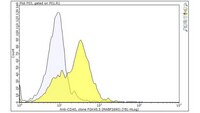Transformation of the tumour microenvironment by a CD40 agonist antibody correlates with improved responses to PD-L1 blockade in a mouse orthotopic pancreatic tumour model.
Luheshi NM, Coates-Ulrichsen J, Harper J, Mullins S, Sulikowski MG, Martin P, Brown L, Lewis A, Davies G, Morrow M, Wilkinson RW.
Oncotarget
7(14)
18508-20
2015
Mostrar resumen
Despite the availability of recently developed chemotherapy regimens, survival times for pancreatic cancer patients remain poor. These patients also respond poorly to immune checkpoint blockade therapies (anti-CTLA-4, anti-PD-L1, anti-PD-1), which suggests the presence of additional immunosuppressive mechanisms in the pancreatic tumour microenvironment (TME). CD40 agonist antibodies (αCD40) promote antigen presenting cell (APC) maturation and enhance macrophage tumouricidal activity, and may therefore alter the pancreatic TME to increase sensitivity to immune checkpoint blockade. Here, we test whether αCD40 transforms the TME in a mouse syngeneic orthotopic model of pancreatic cancer, to increase sensitivity to PD-L1 blockade. We found that whilst mice bearing orthotopic Pan02 tumours responded poorly to PD-L1 blockade, αCD40 improved overall survival. αCD40 transformed the TME, upregulating Th1 chemokines, increasing cytotoxic T cell infiltration and promoting formation of an immune cell-rich capsule separating the tumour from the normal pancreas. Furthermore, αCD40 drove systemic APC maturation, memory T cell expansion, and upregulated tumour and systemic PD-L1 expression. Combining αCD40 with PD-L1 blockade enhanced anti-tumour immunity and improved overall survival versus either monotherapy. These data provide further support for the potential of combining αCD40 with immune checkpoint blockade to promote anti-tumour immunity in pancreatic cancer. | 26918344
 |
The SCID but not the RAG-2 gene product is required for S mu-S epsilon heavy chain class switching.
Rolink A, Melchers F, Andersson J.
Immunity
5(4)
319-30
1996
Mostrar resumen
We have investigated the capacity of precursor B cells from normal (BDF1) and V(D)J recombinase-deficient (RAG-27) or defective (SCID) mice to be induced by a CD40-specific monoclonal antibody and IL-4 to epsilon H chain gene transcription and to S mu-S epsilon switch recombination. In differentiating precursor B cells from all three strains of mice, the development of similar numbers of CD19+, CD23+, CD40+, and MHC class II+ expressing B lineage cells and similar levels of epsilon H chain gene transcription were induced. Efficient S mu-S epsilon switching occurred in normal and RAG-2-deficient, but not in SCID, precursor B cells. Thus, the transcription of the epsilon H chain is independent of the RAG-2 and the SCID gene product, while the S mu-S epsilon switch recombination requires the SCID gene-encoded DNA-dependent protein kinase, but not the RAG-2 protein. | 8885865
 |









